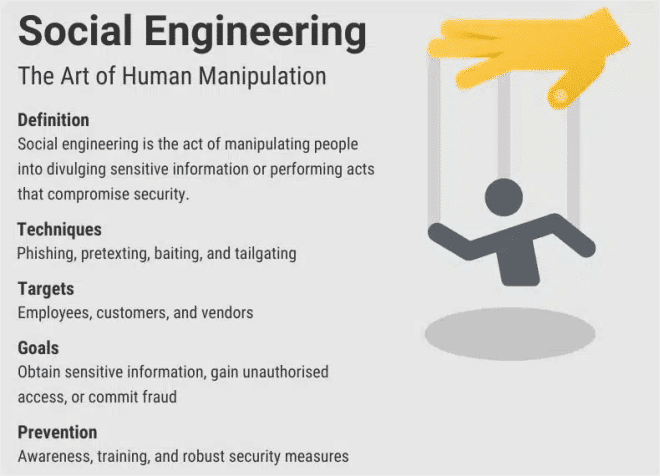What is social engineering?

Social engineering is the act of manipulating others to take specific actions or leak
confidential information in the context of information security. It is similar to
scamming or deception, so the term is often used to refer to fraud or scamming for
the purpose of gathering information, defrauding and accessing computer systems, in
most cases without face-to-face contact between the attacker and the victim.
Although often given a bad name, social engineering actually touches on many aspects
of life.
Wechsler's dictionary defines social as "of or relating to the
life, welfare, and relations of a community" and engineering as "the art or science
of making practical applications of pure sciences such as physics, chemistry, etc.,
as in the construction of engines, bridges, buildings, mines, ships, chemical
plants, etc., mechanical control techniques, or elaborate inventions. "
Combining
these two definitions, it is easy to see that social engineering is an art or better
said, a science, which skillfully manipulates people to take certain actions in
certain aspects of their lives. This definition extends the activities of social
engineers to all aspects of life.
Children use social engineering to get
what they want from their parents, teachers use social engineering to interact with
their students, doctors, lawyers or psychologists use social engineering to get
information from their patients and clients. And, of course, the judiciary uses it,
too, when people are dating. In fact, everyone from infants to politicians uses
social engineering in their interaction activities.
Thus, the definition of
social engineering can be expanded to include the act of manipulating others to take
a particular action, not necessarily in the best interest of the "target person,"
which results in obtaining information, gaining access, or getting the target to
take a particular action.
Social engineering is largely misunderstood,
leading to many different perspectives on how it is defined and how it works. Some
simply see social engineering as lying to get free pizza or to con people out of
their money; others categorize it as a tool for criminals or con artists; others
classify it as a science, believing that its theories can be studied in different
categories or mathematical formulas; and still others see it as a long-lost mystical
art where mastery of social engineering allows practitioners to create powerful
illusions of the mind like magicians.
Everyone uses social engineering
methods every day in a variety of situations. Children use it to get candy,
employees use it to get promotions. From the operations of large government
departments to the marketing practices of small companies, social engineering is
present in one way or another. But criminals and con artists also use social
engineering for the purpose of stealing information from others and committing
crimes. As with any tool, social engineering is not good or bad, it is simply a
multi-purpose tool.